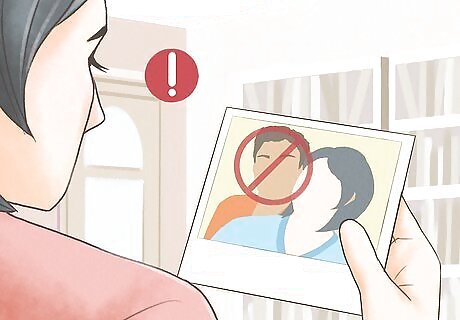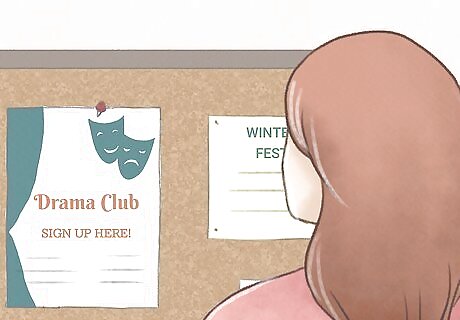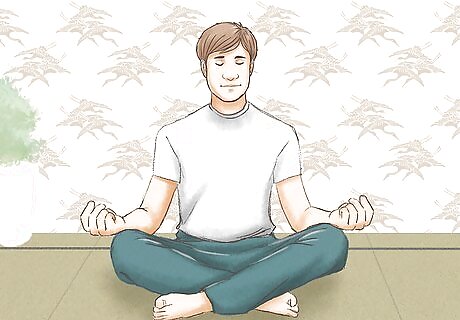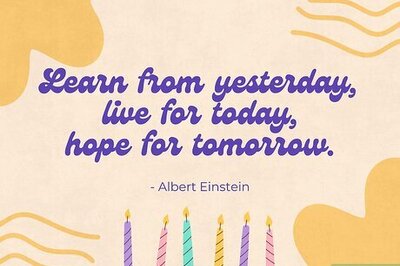
views
Dealing with Past Hurts

Acknowledge your feelings without judging them. If you’re feeling bad about something, trying to ignore your emotions won’t make them go away. Instead, take time to recognize what you’re feeling and acknowledge it without judging, analyzing, or trying to change it. If you find yourself feeling anxious or sad about something that happened, take a few moments to mindfully reflect on what you are thinking and feeling. For example, “I’m really angry about the way my ex broke up with me. When I think about her, I feel tense and frustrated.” You might find it helpful to write down your feelings. Putting your feelings and thoughts into words can make them feel more manageable and help you pinpoint exactly what’s bothering you.

Give yourself time to heal. It takes time to move on from a difficult or traumatic event, such as a breakup or the death of a loved one. Don’t put pressure on yourself to let it go or get over it before you’re ready. Allow yourself to feel your grief, anger, or anxiety as it comes, and remind yourself that you will not always feel the way you are feeling right now. After a loss or any other difficult experience, you will probably have ups and downs. Don’t be discouraged if you start to feel better one day, only to find yourself struggling again the next. This is a normal part of the healing process.

Focus on the moment. While you may not be able to change your feelings, you can make the decision to live with them and work through them. When you’re lingering on the past and feeling terrible about it, make a conscious effort to focus on the present and take life one moment at a time.Tip: If you find yourself stuck on a painful memory, try focusing on your senses. Take a few deep breaths and think about what you can feel, taste, hear, see, and smell. This will help bring you back into the present. Concentrate on whatever specific thing you need to be doing in the moment. For example, if you’re having trouble getting your day started, say to yourself, “Okay, time to eat some breakfast.” Don’t worry about what comes next until you have gotten breakfast out of the way.

Take responsibility for your own feelings. If someone has mistreated you, it’s normal and understandable to feel hurt by their actions. However, blaming another person for your emotions can leave you feeling powerless. You may have good reasons for feeling hurt, but remind yourself that the feelings themselves come from inside of you—not from anyone else. Owning your own feelings isn’t the same as excusing someone else’s actions. You can recognize that someone else acted in a hurtful or inappropriate way towards you while also acknowledging that your feelings and reactions are your own. If you find yourself thinking, “What John did made me so sad,” try rewording it as, “I felt so sad when John treated me that way.”

Find ways to learn and grow from your experiences. When you’re reflecting on the past, look for positive things that you can take away from what happened. Try to find ways that you can use the lessons you’ve learned moving forward. You might ask yourself, “What could I have done differently in that situation, knowing what I know now? What would I do if I found myself in a similar situation again?” For example, if your last relationship ended because you and your partner didn’t have enough in common, you might focus on looking for more compatible people in your future relationships. Angelina Jolie Angelina Jolie, Actress & Humanitarian Live authentically in the present. "It’s hard to be clear about who you are when you are carrying around a bunch of baggage from the past. I’ve learned to let go and move into the next place. Make bold choices and make mistakes. It's all those things that add up to the person you become."

Look at painful memories as though you were a neutral observer. Putting psychological distance between yourself and your memories can help them feel less stressful and overwhelming. When you think back on something bad that happened, try to picture yourself as a “fly on the wall” watching the events instead of as a participant in the scene. Looking at your memories from an “observer” perspective helps give you space from your feelings about what happened. You can also try thinking of yourself as “he/she/they” or “you” instead of “I” when reflecting on a past hurt. For example, instead of “My boss yelled at me in front of everyone,” try “Melanie’s boss yelled at her in front of everyone.”

Try to put negative events in perspective. If something that happened recently is troubling you, imagine yourself as a time traveler visiting your own future. How do you think you’ll feel about this event in a week? What about 10 years from now? Researchers have found that even the most devastating of events—such as the death of a loved one—can feel less distressing if you imagine how you will feel from a far-future perspective.

See a counselor if you need help moving on. Dealing with grief or past hurts can be extremely difficult. If your feelings about a past event don’t start to get better over time, or if you feel like they are seriously disrupting your ability to function in your relationships and day-to-day life, it may be time to seek help from a professional. Ask your doctor to recommend a therapist. If you’re a minor, talk to your parents or another trusted adult about what you are going through, and ask if they can help you find a counselor.
Changing Your Thinking

Examine the reasons that you feel stuck. There are lots of reasons why you might end up feeling stuck or unable to move forward in life. Maybe you feel overwhelmed by too many responsibilities, or perhaps you simply don’t know what you want to do with your life. Take some time to try to pinpoint why you feel the way you do. From there, you can work on finding solutions and taking steps to move yourself ahead. Start by pinpointing the areas where you feel stuck, then try to identify the reasons for that feeling. For example, “I’m lonely, but I’m hesitant to try dating again. Maybe it’s because my last breakup was so difficult, and I’m worried about getting hurt again.”

Look for solutions to problems you can solve. Once you’ve pinpointed what’s holding you back, try to identify which areas you have control over and which ones you don’t. That way, you can focus on fixing the things you have control over. Identify the problem you’d like to focus on and brainstorm a few possible solutions.Tip: Try breaking your problems down into manageable pieces. For example, if you identify one of your problems as “I’m way too busy,” make a list of your current responsibilities. Look over the list and try to find a few obligations you can drop or postpone for now. For example, maybe you’d like to apply for a grant-writing job, but you’re afraid you won’t get it because you lack experience. Possible solutions might include taking grant-writing courses or applying for an internship.

Challenge negative thoughts that might be holding you back. Fear of what might go wrong can really hold you back. If you realize that you’re in a rut because you lack confidence in yourself or you’re convinced that you’ll fail if you try something new, stop and think about whether your thoughts are realistic. Look for evidence to counter your negative thoughts. For example, maybe you’d like to try acting, but you’re afraid to take a class because you think you’ll look foolish in front of your classmates. Try telling yourself, “Probably everyone in the class will be a beginner, like me. Everyone has to start somewhere, and we’ll all be making ourselves vulnerable together.”
Getting Out of a Rut

Set some SMART goals for yourself. In order to move forward in life, it’s a good idea to get a sense of where you want to go. Look at the areas in your life where you’d like to make changes, then set some goals for yourself in those areas. Your goals should be SMART—Specific, Measurable, Attainable, Relevant, and Time-bound. Once you’ve set some goals, think about concrete steps you can make in order to start achieving them. Instead of setting a big, vague goal like “Get a job as an artist,” try breaking that goal up into manageable mini-goals. For example, you might start by signing up for an oil-painting class at your local art studio.

Try something new and challenging. Learning new skills and exploring new experiences are great ways to help yourself break out of a rut. It can also help you build confidence and recognize strengths you didn’t know you had. Try taking a class, picking up a new hobby or sport, or getting out and meeting some new people. When you’re trying something new, don’t give up right away if it doesn’t seem like it’s for you. Try committing to your new project for at least a month so that you have a chance to get comfortable and really get a sense of what it’s all about.

Ask friends and family to help you meet your goals. Your social support network can be really helpful when you’re stuck and not sure how to move on. Brainstorm with your family, friends, and colleagues about how to move forward and meet your goals, or just vent to them if you feel like you’re struggling. If you and someone you know are both working toward the same or similar goals, consider working together. You can hold each other accountable and cheer each other on.

Work on creating healthier habits. It’s natural to form habits or routines, but some of these habits can prevent you from moving forward and accomplishing your goals. If you recognize any habits that may be holding you back, make a conscious decision to replace those unhealthy habits with healthier ones. Choose a specific new habit to take the place of the one you’re trying to change, and remove any triggers that might cause you to fall back on the old habit.Tip: Don’t be discouraged if you occasionally fall back into your old habits or if it takes a while to get into a new routine. It takes several weeks of consistent practice to establish a new habit. For example, if you have a habit of staying up too late playing games on your phone, you might start by removing the games from your phone or using an app to block them at night. Replace the habit with a healthier bedtime routine, such as doing half an hour of meditation before bed.

Change your environment to shake up your routine. Being stuck with the same scenery all the time can make it hard to change your habits and break out of a rut. If you find yourself falling into the same routines day after day, try changing things up a little—for example, if you’re a student, you might try studying in a café or at the library instead of at the desk in your dorm room. If you can’t actually relocate to a new environment, try making changes in the environments where you live or work. For example, you might reorganize your desk or switch out the decorations in your bedroom. If your work or living areas are cluttered, take some time to tidy them up. Having a clean and well-organized environment can help clear your head and make you more productive.




















Comments
0 comment